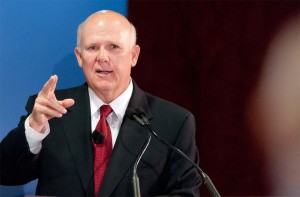General Motors CEO Dan Akerson may have inadvertently woken up the automaker’s dealer base when he said the company wanted to make it easier to buy a vehicle online.
“We want people to start buying cars over the Internet,” said Akerson during the company’s third-quarter earnings conference call.
Perhaps in an attempt to placate dealers before they rallied the troops against the idea, he added that the automaker had no plans to “bypass our dealers” while doing it.
GM wants to expand its Shop-Click-Drive system, he said. The automaker netted about 1,000 buyers after while piloting the program; however, fewer than 10 used the application to buy vehicles without going to a dealership.

David Westcott, chairman of the National Automobile Dealers Association, said that dealers are using the Internet to sell new cars.
GM’s latest effort is just another in a decades long line of attempts by to find ways to use the Internet to sell new cars. Each time the makers begin using the Internet to potentially sell cars, dealers, primarily through its powerful lobby, the National Automobile Dealers Association (NADA), watch with great interest…and the occasional rattle of a saber.
Publicly, the auto dealers have made nice with the web.
David Westcott, NADA chairman, said in a recent speech “car buyers who want to buy over the Internet do so today from dealers. But most want to shop on the Internet and then come into the dealership to take a test-drive and finalize the overall transaction.”
However, in practice, most dealers haven’t been very receptive to the idea preferring to use the Internet to generate sales leads. They are fiercely protective of their ability to sell cars and trucks and not allow manufacturers to bypass them.
There’s been plenty of talk about a “retail revolution” over the past several decades.
Faced with studies that show that buying a car is one of the most unpleasant experiences consumers have to deal with, a number of manufacturers have struggled to revise the retail system. In some instances, that means passing new guidelines and, quite often, backing up the rules with financial rewards for those dealers who go along.
A few automakers, including Ford, have taken things further, experimenting with alternatives including online retailing and factory-owned stores. But faced with significant backlash that included some angry court fights, the major manufacturers have so far all backed down.
Ford introduced an online site called FordOnline in the U.K. in 2010. It allowed buyers to complete a purchase online and have the vehicle delivered by one of 50 dealerships that are wholly owned by Ford. The site has not migrated to the U.S. yet.
There are sites like CarsDirect.com and Autobytel can help you compare different makers, but you can’t buy from them. Even that type of site raised the hackles of dealers. In 2006, TrueCar.com began providing users with a boatload of pricing information. Many dealers complained the website made too much information about vehicle costs too transparent.
TrueCar’s model has changed since its inception. It still provides pricing information to users, but it has partnered with dealerships across the country in a symbiotic relationship where TrueCar gives out a price and then points out the dealer who is willing to sell the vehicle for that amount.
Perhaps the closest anyone’s been able to come to circumventing the traditional dealership is AutoNation, which recently sold its 9 millionth vehicle. The company allows shoppers to spec out a new vehicle on its website and then go into the dealership to pick it up.
An AutoNation dealership features vehicles from 33 different brands, including the Detroit Three makers. AutoNation has 266 dealerships in 15 states, and approximately 20,000 employees. It offers all of the services of a single-point dealership, including financing, service and repair, etc.
However, there may be a change coming. One only needs to look at the current darling of the automotive world, Tesla Motors, to see it.
The Palo Alto, Calif.-based electric vehicle maker has been engaged a protracted battle with dealer groups across the country, including lawsuits in Colorado, Texas, Massachusetts and New York, so it can sell its vehicles out of company-owned retail locations.
(Cadillac planning to “tackle” Tesla. For more, Click Here.)
It has been moderately successful in places like Massachusetts and Colorado where it currently has stand-alone, company-owned outlets. However, it doesn’t hurt to have a determined billionaire like Elon Musk helming the company putting up the fight and more importantly, the money for the fight.
While automakers are keeping an eye on the success of Musk and Tesla, for now they’re content to keep dealers happy by simply using the Internet as a marketing tool aimed at younger buyers.
(Click Here to read the “most American” vehicles.)
Akerson believes an improved online experience would appeal to younger buyers who seemingly will buy anything on the Internet.
“We’re trying to evolve, not only from an internal perspective, but from an external perspective, to a more 21st-Century information-based marketing company,” Akerson said.


Online car buying isn’t going to sit well with dealers and it shouldn’t unless the car maker is going to sell at the sticker price. Then most people will not buy online and the dealers will still get the majority of sales. It’s not good for a mfg. to compete with it’s dealers who buy a franchise.
In Texas, it’s against the law to buy a Tesla online!
It’s “good old boy” politics at it’s worst.
Pretty much illegal to sell cars online anywhere, at least unless you are a franchised dealer.
Paul E.
It’s pretty understandable that those who buy a franchise don’t want to compete with their supplier who has a price advantage but does not need to service the product after the sale.